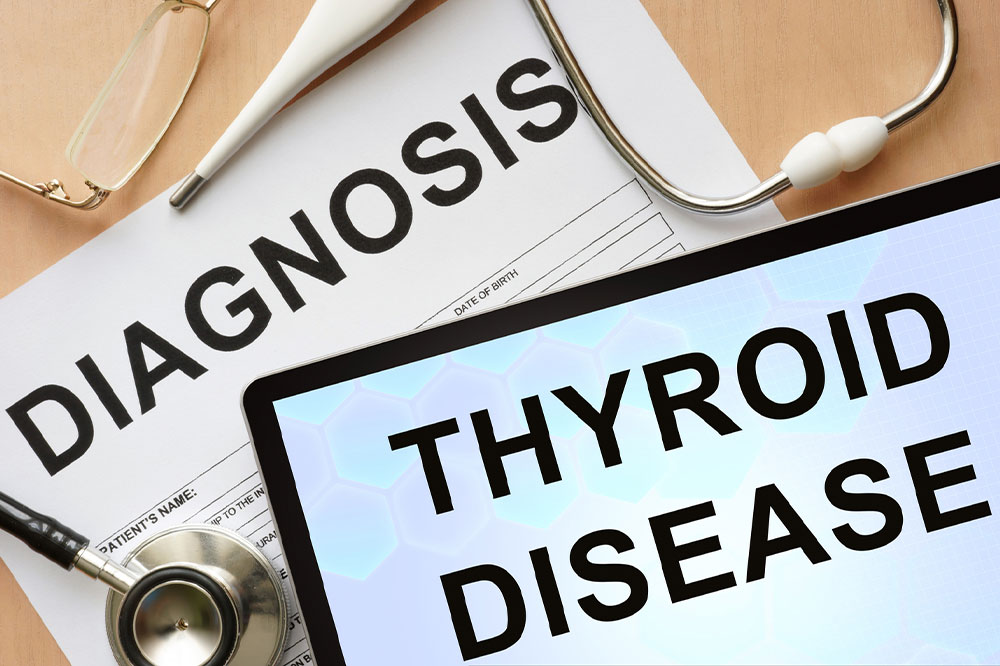Thyroid Symptoms, Causes, Natural Remedies and Side Effects
The thyroid gland, which is a butterfly-shaped gland, sits in the front of the neck. It makes the thyroid hormone, which is used by the body for growth and metabolism. It is regulated by the pituitary gland, which is located at the base of the brain and releases a hormone called thyrotropin (TSH).

What is the thyroid?
The thyroid produces two important hormones: thyroxine (T4) and triiodothyronine (T3), that are responsible for regulating the body’s metabolism, including the body’s temperature, heart rate, and breathing.
The thyroid is also responsible for producing a hormone called calcitonin, which helps regulate calcium levels in the blood.
Irregularities or imbalance in the secretion of the hormone causes thyroid problems that are manifested in a variety of symptoms, including weight gain or loss, fatigue, anxiety, depression, hair loss, and irregular menstrual cycles.
When thyroid levels are too high, it’s called hyperthyroidism and can cause weight loss, anxiety, and heart palpitations. When levels are too low, it’s called hypothyroidism and can cause fatigue, weight gain, and depression.
Hyperthyroidism (overactive thyroid)
Hyperthyroidism is a condition in which the thyroid gland produces too much thyroid hormone.
There are a number of potential causes of hyperthyroidism, and it can sometimes be difficult to determine the exact cause. However, the most common cause is an autoimmune disorder called Graves’ disease. In Graves’ disease, the body produces antibodies that attack the thyroid gland, causing it to produce too much thyroid hormone.
Other potential causes of hyperthyroidism include:
Thyroiditis : This is an inflammation of the thyroid gland that can be caused by a viral infection or autoimmune disorder.
Tumors : Both benign and cancerous tumors can cause the thyroid gland to produce too much hormone.
Excess iodine : Consuming large amounts of iodine can cause the thyroid gland to become overactive.
The most common symptom of hyperthyroidism is an enlarged thyroid gland, which can cause the neck to appear swollen or goiter. Other symptoms include:
- Nervousness
- Anxiety
- Irritability
- Fatigue
- Muscle weakness
- Tremors
- Increased appetite
- Weight loss
- Diarrhea
- Heat intolerance
- Sweating
- Changes in menstrual patterns
- Impotence
Hypothyroidism (underactive thyroid)
Primary hypothyroidism is caused by problems with the thyroid gland itself. This can include autoimmune conditions such as Hashimoto’s disease, where the body attacks the thyroid gland; inflammation of the thyroid gland (known as thyroiditis); or surgical removal of the thyroid gland. Secondary hypothyroidism occurs when there is damage to the pituitary gland, which is responsible for releasing a hormone that regulates the thyroid gland. This can be caused by conditions such as tumors, radiation therapy, or certain medications.
Symptoms of hypothyroidism can vary depending on the severity of the condition but may include fatigue, weight gain, constipation, dry skin, hair loss, and feeling cold all the time.
Causes of thyroid problems
There are a number of different causes of thyroid problems and these can be divided into two main categories – Autoimmune and Non-autoimmune.
Autoimmune causes include
- Hashimoto’s disease
- Graves’ disease
Non-autoimmune causes include
- Iodine deficiency
- Pituitary gland problems
- Certain courses of treatment
- Stress
- Not getting enough sleep
In some cases, the cause of thyroid problems is unknown.
Common Symptoms of thyroid problems
There are a number of different symptoms that can be associated with thyroid problems. The common ones include –
- Fatigue
- Weight gain or loss
- Dry skin
- Hair loss
- Anxiety
- Depression
- Irritability
- Muscle weakness Joint pain
- Constipation or diarrhea
- Abnormal menstrual cycles
In more severe cases, thyroid problems can lead to heart palpitations, irregular heartbeat, and tremors.
How can thyroid problems be treated in men and women
Some treatments are natural, while others may require a doctor’s intervention.
Natural remedies for thyroid problems are:
Eating a healthy diet that includes
- Plenty of fresh fruits and vegetables
- Herbal teas such as ginger, licorice, and dandelion tea
- Lean protein
- Healthy fats such as seeds, nuts and fish
Getting regular exercise
Regular exercise can help to improve thyroid function by increasing circulation and improving the delivery of nutrients to the cells.
Avoiding stress
Reducing stress levels can also be helpful in improving thyroid function. Stress management techniques such as yoga, meditation, and deep breathing can be beneficial.
Getting enough sleep.
Taking supplements such as iodine, selenium, and zinc.
It is important to see a doctor as soon as symptoms of thyroid appear. Timely diagnosis and treatment are essential to ease symptoms and treat thyroid problems.











